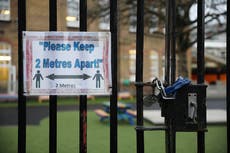Schools in northern England showing less interest in tutoring catch-up scheme, official says
Uptake is ‘slightly slower’ in areas ‘where tutoring is seen as less normal part of academic life’, DfE director says
Your support helps us to tell the story
From reproductive rights to climate change to Big Tech, The Independent is on the ground when the story is developing. Whether it's investigating the financials of Elon Musk's pro-Trump PAC or producing our latest documentary, 'The A Word', which shines a light on the American women fighting for reproductive rights, we know how important it is to parse out the facts from the messaging.
At such a critical moment in US history, we need reporters on the ground. Your donation allows us to keep sending journalists to speak to both sides of the story.
The Independent is trusted by Americans across the entire political spectrum. And unlike many other quality news outlets, we choose not to lock Americans out of our reporting and analysis with paywalls. We believe quality journalism should be available to everyone, paid for by those who can afford it.
Your support makes all the difference.Schools in northern England have shown less interest in a tutoring catch-up scheme compared to ones in the south, a government official has said.
Graham Archer from the Department for Education (DfE) said uptake of the National Tutoring Programme (NTP) has been slower in areas where tutoring is viewed as “a less normal part of academic life”.
The scheme – designed to provide disadvantaged pupils with tuition – is part of government plans to help children catch up on missed learning due to the coronavirus pandemic.
It allows schools to access heavily subsidised tuition from a list of partners, as well as supporting those in the most disadvantaged areas to employ academic mentors to give intensive catch-up support.
Mr Archer told the education select committee on Tuesday there has been differing levels of interest across the country for the NTP, which schools need to sign up for.
“We are seeing a slightly slower take up in – I think – areas of the country where tutoring is seen as a less normal part of academic life,” the DfE’s director for qualifications, curriculum and extra-curricular told MPs.
“It is slower to take up in the north, essentially, than the south.”
He said the DfE was “working closely” with tutoring partners, schools and local authorities in those areas and using regional teams “to push hard the message of the benefits of tutoring to those pupils”.
The programme aims to provide tuition to around 250,000 children who “require extra support due to Covid-19”, the government says.
Around 150,000 children have been signed up for the scheme so far, Mr Archer told the committee.
He said the DfE planned to get this figure to 250,000 over the current academic year, and expected to see a “sharp increase” in numbers as more children return to school next month.
The government recently announced Sir Kevan Collins as the new education recovery commissioner. He is tasked with overseeing plans to help children catch-up on missed learning due to the pandemic.
He said earlier this month teachers will be asked to increase learning time for children in light of disruption over the previous 12 months.
Most students were told to stay at home from last March until the start of June, when some year groups were allowed back into the classroom in England.
While all students were allowed back from September to December last year, children faced remote learning if told to self-isolate as a close contact of a coronavirus case.
Schools moved online for all but vulnerable pupils and the children of key workers in early January. All pupils will be allowed back on 8 March.
In June last year, Boris Johnson announced a £1bn plan to help pupils in England make up lost learning time following months of school closures.
He said £350m would be spent on the NTP over the 2020-21 academic year to help the most disadvantaged pupils, while an additional £650m would be shared across schools to help children from all backgrounds who have missed lessons.
Last month, an extra £300m of new money was announced for tutoring in early years settings, schools and colleges to help children catch up.
Experts have warned emphasis on the need to “catch-up” on lost learning is putting children under “huge” pressure.
They have also called for children to be allowed to play with friends this summer, taking account of the importance of mental health, instead of doing extra lessons.
It comes amid speculation catch-up plans for pupils who have missed out on learning due to coronavirus could include summer schools, extended school days or shorter summer holidays.
Sir Kevan, the new education recovery tsar, has called the government’s £1.3bn package of catch-up support a “good start”.
Additional reporting by PA
Subscribe to Independent Premium to bookmark this article
Want to bookmark your favourite articles and stories to read or reference later? Start your Independent Premium subscription today.






Join our commenting forum
Join thought-provoking conversations, follow other Independent readers and see their replies
Comments